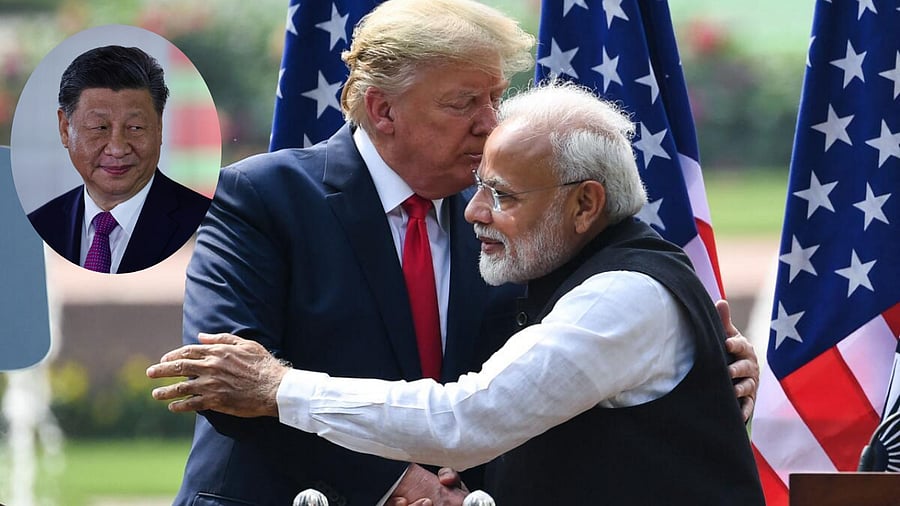
Prime Minister Narendra Modi with US President Donald Trump. (Inset: Chinese President Xi jinping).
Credit: Reuters Photos
The relationship with the United States is hugely consequential for India. The issue is whether it is pivotal at a juncture when the US itself is adapting to a multipolar world order. The unseemly haste in scheduling the trip by Prime Minister Narendra Modi to the White House came as a surprise.
The Indian media reported that Modi is going with a transactional agenda, although Trump’s attention span is limited with a plethora of profound issues — the US’ relations with Russia and China, the West Asian situation, the reset in the Western Hemisphere and the unravelling of the transatlantic system.
The really dispiriting aspect is that the compass to navigate India’s transition from the old regime in Washington to the brave new world that Trump is ushering in happens to be the same one that External Affairs Minister S Jaishankar probably would have used 20 years ago as the head of the Americas Division in the foreign ministry — geared to insert India into the top rungs of the US foreign policy strategies.
This compass had three poles — firstly, a defence relationship whereby since 2008, purchase of American weaponry “emerged as a central facet of the US-India security partnership” — per a Congressional Research Service report last December. Over time, this template has come to acquire a geopolitical dimension as well, since the US government is also “actively encouraging India to reduce its dependence on Russian-origin defence articles.”
Energy is the second pole. The landmark 2008 nuclear co-operation agreement did not deliver anticipated gains, but in contrast, oil and gas yielded to US diplomacy. Sanctions against Iran and Venezuela significantly helped US energy diplomacy to gain market share for its crude oil exports, while India also took a conscious decision to accommodate US crude gains, despite being an extremely price-sensitive oil market — and US crude is expensive.
A third pole must be India’s conviction that it could be a ‘counterweight’ to China — an assumption that American think tankers and officials assiduously strove to inject into the Indian mind. This manifests in the Quad. Curiously, no sooner than the new US Secretary of State Marco Rubio took charge, India scrambled to plant on his impressionable mind the idea of him hosting Quad meeting, which testifies to the ‘unseemly haste’ mentioned above. Even Chinese analysts could see that it turned out to be a vacuous event.
The need of such a rusty compass to navigate the current fluid transition is debatable. The Trump administration is still figuring out the tone of its foreign policy, including co-operation with allies. Trump's return to the White House means a shift in the US' domestic and foreign policy. A year of geopolitical turmoil lies ahead.
Meanwhile, new realities have emerged. Principally, the antagonistic content of Russian-American relations has intensified and become very critical. Trump has zero chance of getting Russia to compromise on its terms for a negotiated Ukraine settlement. The US has no leverage over Russia. Pursuit of the proxy war is a futile effort, too.
Russia is emerging out of the war as a formidable military power with a soaring self-empowerment after inflicting a historic defeat on NATO even as its booming economy beat back Western sanctions.
The ensuing contraction of the US’ capacity to effectively pursue the Indo-Pacific strategy itself becomes a paradigm shift as Trump is unlikely to be confrontational with China — and time works in China’s favour. In sum, the Russia-China alliance is checkmating the US in Eurasia and the Indo-Pacific. Trump may already be sensing the need of a modus vivendi with Russia and China. A Yalta 2.0 may be the best way forward.
All this means that India cannot afford to let regression happen to India-China relations, given the progress achieved lately. A good opportunity is at hand for Modi to meet Xi Jinping for a second time in a year during the forthcoming SCO summit.
Our choice in the emerging scenario is not about repackaging India to become eligible for a seat in Trump’s cockpit for a bumpy flight into the realm of the ‘unknown unknown’, but to optimally explore the potentials of multi-alignment with feet planted firmly on the ground as an independent thinker and actor. To my mind, Modi who has emerged as the strongest Indian leader ever can swing a historic settlement with China.
Again, BRICS merits serious attention. The future belongs to inclusive groups like BRICS. The strategic understanding with Russia is of pivotal importance in all this. The high ground reached in that relationship marks a brilliant success of personal diplomacy at the highest levels of the two leaderships. And it becomes a strategic asset for Modi to stabilise the troubled relations with China as well.
(M K Bhadrakumar is a former diplomat.)
Disclaimer: The views expressed above are the author's own. They do not necessarily reflect the views of DH.